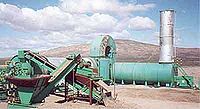Difference between revisions of "Refractory Lined Dryers"
Jump to navigation
Jump to search
PurplePen19 (talk | contribs) |
PurplePen19 (talk | contribs) |
||
| Line 8: | Line 8: | ||
'''Refractory Lined Dryers''' are designed to withstand much higher temperatures than [[Rotary Dryers]]. Typically, if you are dealing with a direct fired rotary [[ | '''Refractory Lined Dryers''' are designed to withstand much higher temperatures than [[Rotary Dryers]]. Typically, if you are dealing with a direct fired rotary [[Kilns]], it is refractory lined with a brick or castable lining. This lining protects the steel shell. Rotary dryers are typically not lined, and their steel is not able to withstand such high temperatures. If you are dealing with an indirect rotary kiln, the kiln is not normally lined, so the shell of the drum has to be made out of a temperature resistant alloy instead of steel. | ||
Latest revision as of 02:08, 19 August 2012
Refractory Lined Dryers are designed to withstand much higher temperatures than Rotary Dryers. Typically, if you are dealing with a direct fired rotary Kilns, it is refractory lined with a brick or castable lining. This lining protects the steel shell. Rotary dryers are typically not lined, and their steel is not able to withstand such high temperatures. If you are dealing with an indirect rotary kiln, the kiln is not normally lined, so the shell of the drum has to be made out of a temperature resistant alloy instead of steel.
